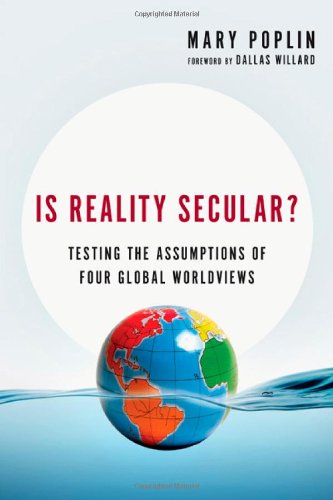Book review: Is Reality Secular
by Mary Poplin
★★★★★
Well, this book was a trip. Great book, yet Mary Poplin and I definitely do not agree on all matters. I highlighted many passages that Poplin presents as fact but which critical scholarship concludes are otherwise. The book of Daniel wasn’t really written 600 years before Christ. Peter couldn’t possibly have written the book of II Peter. There really are mythical beings in the Bible (Poplar claims there are not). I experienced a wide range of emotions as I read the book: anger, frustration, respect, admiration. Then I gave the book five stars, because it is indeed well-written, intelligent, convincing, accurately reflective of Poplin’s Christian experience … and because she changed my mind in places.
I’ve often said that every person should undergo two major overhauls in their belief system during their life, for their own spiritual growth. I look forward with great anticipation to my next spiritual revelation, but I know I’m not ready yet.
Poplin was ready. She embraced Jesus hook, line and sinker, to the point where she sometimes sounds naïve. Yet she has clearly located the worldview that works for her. Poplin is surely aware of this odd contrast, with naiveté and intellectual writing side by side, and makes no apology, as she titles her final chapter “What if Christianity were true?”
This book is her spiritual journey and studies, comparing four worldviews (material naturalism, secular humanism, pantheism, and monotheism) and concluding that the latter, Christianity in particular, is the higher truth. The fundamental concern here is whether one of these worldviews is actually true. While each worldview contains a partial truth, Christianity supersedes each and carries believers further, opening up deeper revelations. These revelations did not come all at once for Poplin; she reflects on twenty years of following Christ, including a stint in Calcutta with Mother Teresa.
Her approach to “proving” Christianity is not normative apologetics. It is measuring the benefits of each worldview in various ways, which is why the book so appealed to me. Which worldview leads to the healthiest morals? Which best fits scientific discovery? Which psychology is most beneficial? In examining such things, Poplin journeys from truth to Truth, a higher level, and concludes that Christianity carries a person far beyond the limited truths of its competitors. Christianity, and the Trinity, encompasses the true and reasonable principles of all three other worldviews and offers even more. We get science without naturalism, humanism without relativity, and the spiritual beyond the impersonal and individual. But the problem in “proving” such claims is that Christianity can only be comprehended in a shallow, textbook way, until it is lived.
Here is an example. When Poplin converted to Christianity, she became deeply remorseful over two abortions she had had. Until her conversion, the healthiest option she could come up with to live with herself was to deny her sin, pretending that sin didn’t really exist, moralizing that by aborting she had made the logical, secular decision. After her conversion, she writes “Now I see that the solution to sin—the simple acknowledgement of sin for what it is and seeking God’s forgiveness and cleansing—is one of the most brilliant, hopeful and freeing principles of Judeo-Christianity.” The higher truth: Life is better as a Christian, and our eyes are opened.












 354 Circles
354 Circles
 603 Goodreads Friends & Fans
603 Goodreads Friends & Fans

 Hello! I'm an author, historical Jesus scholar, book reviewer, and liberal Christian, which means I appreciate and attempt to exercise the humanitarian teachings of Jesus without getting hung up on any particular supernatural or religious beliefs.
The Bible is a magnificent book that has inspired and spiritually fed generations for thousands of years, and each new century seems to bring a deeper understanding of life’s purpose. This is true of not only Christianity; through the years, our age-old religions are slowly transforming from superstitious rituals into humanitarian philosophies. In short, we are growing up, and I am thrilled to be riding the wave.
I avidly read all thought-provoking religion titles. New authors: I'd love to read and review your book!
Hello! I'm an author, historical Jesus scholar, book reviewer, and liberal Christian, which means I appreciate and attempt to exercise the humanitarian teachings of Jesus without getting hung up on any particular supernatural or religious beliefs.
The Bible is a magnificent book that has inspired and spiritually fed generations for thousands of years, and each new century seems to bring a deeper understanding of life’s purpose. This is true of not only Christianity; through the years, our age-old religions are slowly transforming from superstitious rituals into humanitarian philosophies. In short, we are growing up, and I am thrilled to be riding the wave.
I avidly read all thought-provoking religion titles. New authors: I'd love to read and review your book!
 Hi! While Lee writes the articles and reviews the books, I edit, organize, and maintain the blog. The views expressed here are Lee's but I'm his biggest supporter! :-)
Hi! While Lee writes the articles and reviews the books, I edit, organize, and maintain the blog. The views expressed here are Lee's but I'm his biggest supporter! :-)
0 Comments
Trackbacks/Pingbacks